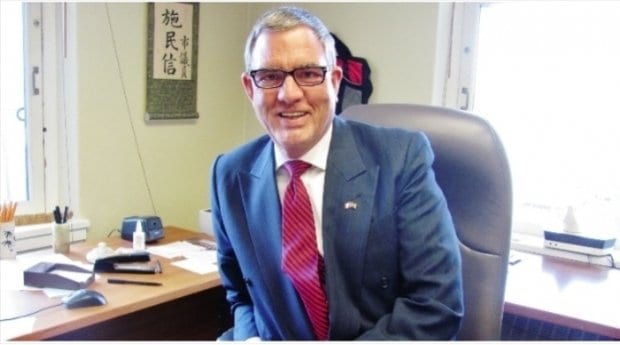Tim Stevenson’s career is sprinkled with pioneering moments: he was the first out gay person ordained by the United Church of Canada; on a New Democratic Party (NDP) slate, he became the first out gay MLA in 1996; and he went on to serve as the first openly gay provincial cabinet minister in Canada, in 2000 and 2001.
Stevenson made the switch to municipal politics when he was first elected to Vancouver’s city council in 2002, running under a Coalition of Progressive Electors (COPE) banner. He has since been reelected on a Vision Vancouver ticket in 2005, 2008 and 2011.
Prior to venturing into electoral politics, Stevenson was an international observer in South Africa’s first post-apartheid election and worked with that country’s Black Liberation Gay and Lesbian Movement.
In addition to his groundbreaking ordination in 1992, Stevenson points to his much-publicized trip to Sochi, Russia, earlier this year, to lobby the International Olympic Committee (IOC) for gay-friendly changes to the Olympic Charter, as a pivotal moment in his political life.
Partly as a result of that lobbying, and following the global outcry over Russia’s enactment of anti-gay legislation in the lead-up to hosting the 2014 Winter Games, the IOC has now announced that future host countries must meet tougher anti-discrimination criteria to be considered. Though the tougher criteria don’t explicitly include sexual orientation and gender identity as prohibited grounds of discrimination, Stevenson welcomes the change as a huge success. “I get goose bumps thinking about that,” he says.
Turning his sights back to Canada, he recalls how minimal the community’s rights were when he got into provincial politics. Being and having a constant political presence is critical for the community, he insists. He’s adamant about the importance of having community members on council and on the park and school boards.
“I have felt for a very long time, the presence itself — just the very presence — is huge, because it means there’s a gay person always at the table, always reminding people there are issues that are similar but yet very different from other communities,” he says.
During his term with then-mayor Larry Campbell and COPE, Stevenson recalls working to raise the community’s profile by pitching the idea of holding annual Pride celebrations at city hall, performing a gay marriage on its rainbow-painted steps, and joining forces with former councillor Ellen Woodsworth to plan the 35th anniversary of the Stonewall riots at Cambie and 12th.
With Vision, Stevenson introduced a successful motion to grant civic status to Vancouver’s Pride parade in 2013, which meant that a raft of city fees for the event could finally be waived.
In 2013, the Vision-led city council approved a new West End community plan that specifically names Davie Village as the historical and cultural hub of the gay community.
“I’m playing inside baseball, I know, but this has never been done before in the city, where our community actually gets into a plan,” says Stevenson, who’s now keen to ensure that the plan is implemented, including the construction of rental housing and social housing.
Still high on his to-do list is the establishment of a queer community centre. “What I want to make sure is that this is not reversible,” he says of the $7 million in community amenity contributions that have been allocated to the development of a centre.
Stevenson would also like to establish a closer working relationship with Tourism Vancouver in light of what he calls the “huge amount of press” the city has garnered and to ensure that Davie Village is a vibrant hub for the LGBT community. “If we lose this, we don’t really have a place for people to come to. When most of us go to another city, we head to places where our community gathers,” he points out. “If this dissipates, that will be hugely problematic. It’s key for the Village to be maintained.”
These days, the community’s goals are more in tandem with the general population’s, he observes, because queer people have won so many victories on the equality front. “We’re much more aligned with the rest of the population on issues like affordable housing, because that’s something that’s extremely important for us as it is for everybody, and certainly in the West End.”
He acknowledges that there are people who are not happy with the city’s development track but says Vancouver has to make room for the thousands of people who will eventually move here. “This a dynamic, moving, changing city,” he says. “We have to get more density.”
As he seeks to secure a fifth consecutive term on city council, he says one of his main priorities is to ensure that the gains the LGBT community has made remain firmly anchored, immune to reversals from future governments.
Stevenson says he’s “cautiously optimistic” about Vision’s chances of winning another term in office. “I think that we deserve a third term; I think we have a lot to complete.”


 Why you can trust Xtra
Why you can trust Xtra


